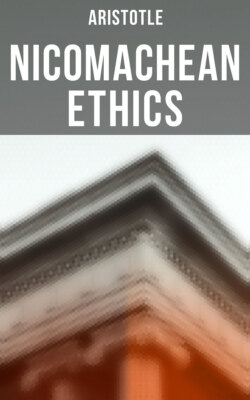Aristotle: Nicomachean Ethics

Реклама. ООО «ЛитРес», ИНН: 7719571260.
Оглавление
Aristotle . Aristotle: Nicomachean Ethics
Aristotle: Nicomachean Ethics
Reading suggestions
Table of Contents
Introduction
Book One
Part I
Part 2
Part 3
Part 4
Part 5
Part 6
Part 7
Part 8
Part 9
Part 10
Part 11
Part 12
Part 13
Book Two
Part I
Part 2
Part 3
Part 4
Part 5
Part 6
Part 7
Part 8
Part 9
Book Three
Part I
Part 2
Part 3
Part 4
Part 5
Part 6
Part 7
Part 8
Part 9
Part 10
Part 11
Part 12
Book Four
Part I
Part 2
Part 3
Part 4
Part 5
Part 6
Part 7
Part 8
Part 9
Book Five
Part I
Part 2
Part 3
Part 4
Part 5
Part 6
Part 7
Part 8
Part 9
Part 10
Part 11
Book Six
Part I
Part 2
Part 3
Part 4
Part 5
Part 6
Part 7
Part 8
Part 9
Part 10
Part 11
Part 12
Part 13
Book Seven
Part I
Part 2
Part 3
Part 4
Part 5
Part 6
Part 7
Part 8
Part 9
Part 10
Part 11
Part 12
Part 13
Part 14
Book Eight
Part I
Part 2
Part 3
Part 4
Part 5
Part 6
Part 7
Part 8
Part 9
Part 10
Part 11
Part 12
Part 13
Part 14
Book Nine
Part I
Part 2
Part 3
Part 4
Part 5
Part 6
Part 7
Part 8
Part 9
Part 10
Part 10
Part 12
Book Ten
Part I
Part 2
Part 3
Part 4
Part 5
Part 6
Part 7
Part 8
Part 9
Отрывок из книги
Aristotle
Book Two
.....
The form of the thinking which enters into conduct is that which terminates in the production of a rule which declares some means to the end of life. The process presupposes (a) a clear and just apprehension of the nature of that end—such as the Ethics itself endeavours to supply; (b) a correct perception of the conditions of action. (a) at least is impossible except to a man whose character has been duly formed by discipline; it arises only in a man who has acquired moral virtue. For such action and feeling as forms bad character, blinds the eye of the soul and corrupts the moral principle, and the place of practical wisdom is taken by that parody of itself which Aristotle calls "cleverness"—the "wisdom" of the unscrupulous man of the world. Thus true practical wisdom and true goodness of character are interdependent; neither is genuinely possible or "completely" present without the other. This is Aristotle's contribution to the discussion of the question, so central in Greek Moral Philosophy, of the relation of the intellectual and the passionate factors in conduct.
Aristotle is not an intuitionist, but he recognises the implication in conduct of a direct and immediate apprehension both of the end and of the character of his circumstances under which it is from moment to moment realised. The directness of such apprehension makes it analogous to sensation or sense-perception; but it is on his view in the end due to the existence or activity in man of that power in him which is the highest thing in his nature, and akin to or identical with the divine nature—mind, or intelligence. It is this which reveals to us what is best for us—the ideal of a happiness which is the object of our real wish and the goal of all our efforts. But beyond and above the practical ideal of what is best for man begins to show itself another and still higher ideal—that of a life not distinctively human or in a narrow sense practical, yet capable of being participated in by man even under the actual circumstances of this world. For a time, however, this further and higher ideal is ignored.
.....